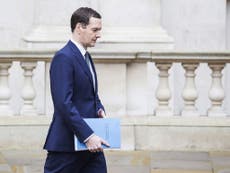Autumn Statement: Forget the idea that parts of the public sector will be protected
It is difficult to know which is worse: duplicity to achieve an ideological goal or pursuing that goal incompetently

There were surprises, including a couple of U-turns on previously announced cuts. Yet with a three-year spending review it is important to focus on the big picture. George Osborne plans a sustained period of massive public sector cuts and asset sales in order to finance lower taxes and achieve a budget surplus.
Forget the idea that parts of the public sector will be protected. NHS spending will rise in real terms, but it will fall as a share of GDP, as it did over the past five years. An ageing population and medical advances mean that health spending needs to rise faster than GDP, as it has done almost continuously since the Second World War. Add to this pressure from cuts to local authority care, and the idea that the NHS is being protected becomes laughable.
In education, the pledge to maintain real spending on schools means real spending per pupil falls. This pledge does not apply to pupils over 16, implying larger real cuts there. The aid budget is likely to be raided by other departments. The only department that may see genuine protection is defence.
The Chancellor does not talk about how these cuts are needed to fund reductions in inheritance tax, but instead focuses on his fiscal charter to achieve budget surplus by 2019-20. We are told we need a surplus to reduce debt. However, the nominal amount of Government debt is meaningless: what matters is the ratio of debt to GDP. Inflation and growth mean any deficit less than 3 per cent of GDP will reduce that ratio. What the fiscal charter really implies is that debt relative to GDP will fall rapidly.
The Chancellor says we need this rapid reduction in case another financial crisis happens. However, he ignores risks to the world economy over the next few years, which, with interest rates very low and spending cuts, leave the economy vulnerable. This was the mistake he made in 2010, which lost the average household the equivalent of at least £4,000. In addition, when interest rates and wage costs are low we should be borrowing to increase investment, as any dynamic firm would do. The Chancellor is fond of talking about extra infrastructure investment, but the change in announced public net investment compared to July is tiny: 0.2 per cent of GDP over five years.
Public investment, averaging just 1.6 per cent of GDP, remains low at a time when it should be high. Economists are notorious for disagreeing with each other, but I have not seen a single economist defend this fiscal charter.
Ironically, many of the Chancellor’s policies actually worsen the long-term health of the public finances. Cutting the number of tax collectors will reduce the ability to track down tax dodgers. Privatisations typically reduce future state revenues or raise future public sector costs. Other cuts threaten future economic growth and therefore tax revenues. Doing this makes sense when you understand the Chancellor’s real motivation.
To quote Lord Turnbull, a former head of the civil service who supported austerity in 2010, the Chancellor really wants a smaller state. The fiscal charter smokescreen exists because he suspects the public does not share his wish for a smaller share of GDP spent on the NHS, education and other public services. Yet so much of this is arbitrary, with even the Prime Minister unaware of what is happening on the ground, as his recent exchange of letters with his constituency’s council revealed. The method seems to be to cut until there is a visible crisis. It is difficult to know which is worse: duplicity to achieve an ideological goal or pursuing that goal incompetently.
Simon Wren-Lewis is Professor of Economic Policy at the Blavatnik School of Government, Oxford University





Join our commenting forum
Join thought-provoking conversations, follow other Independent readers and see their replies